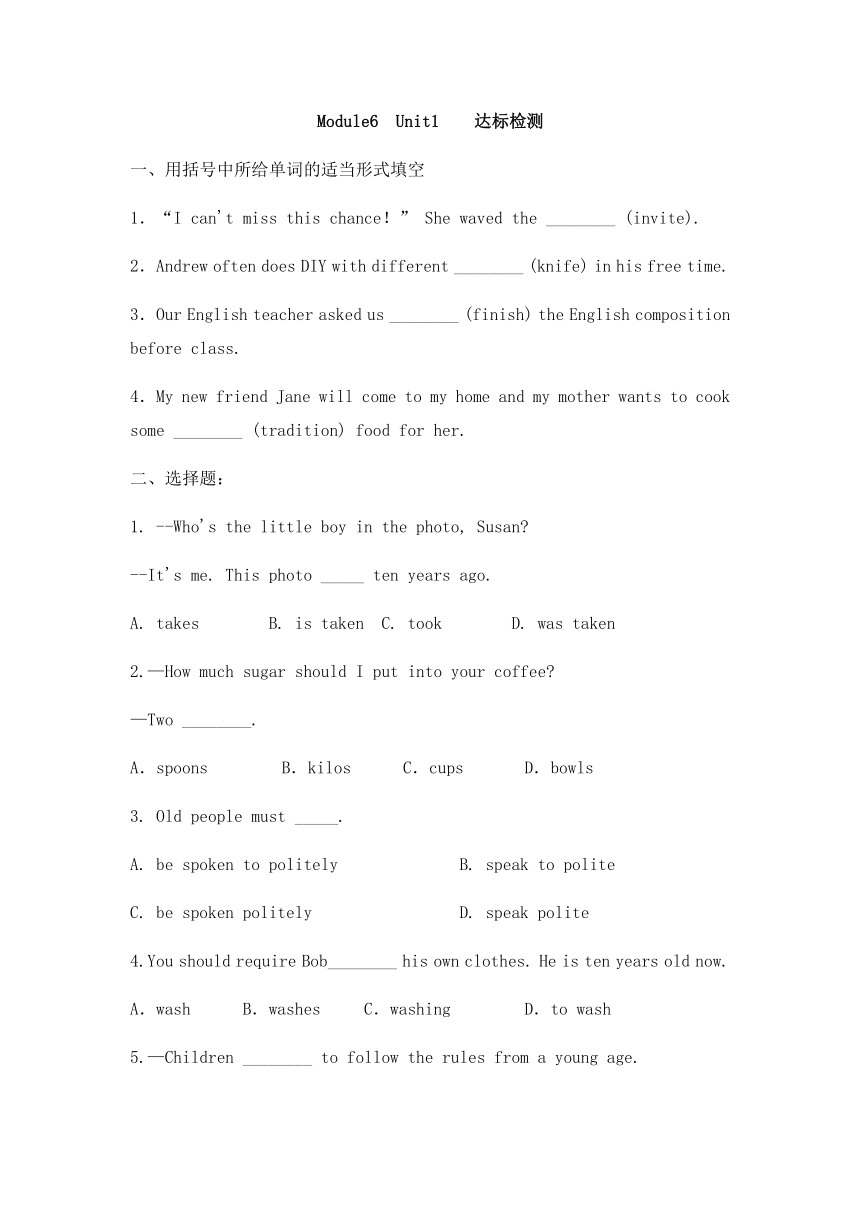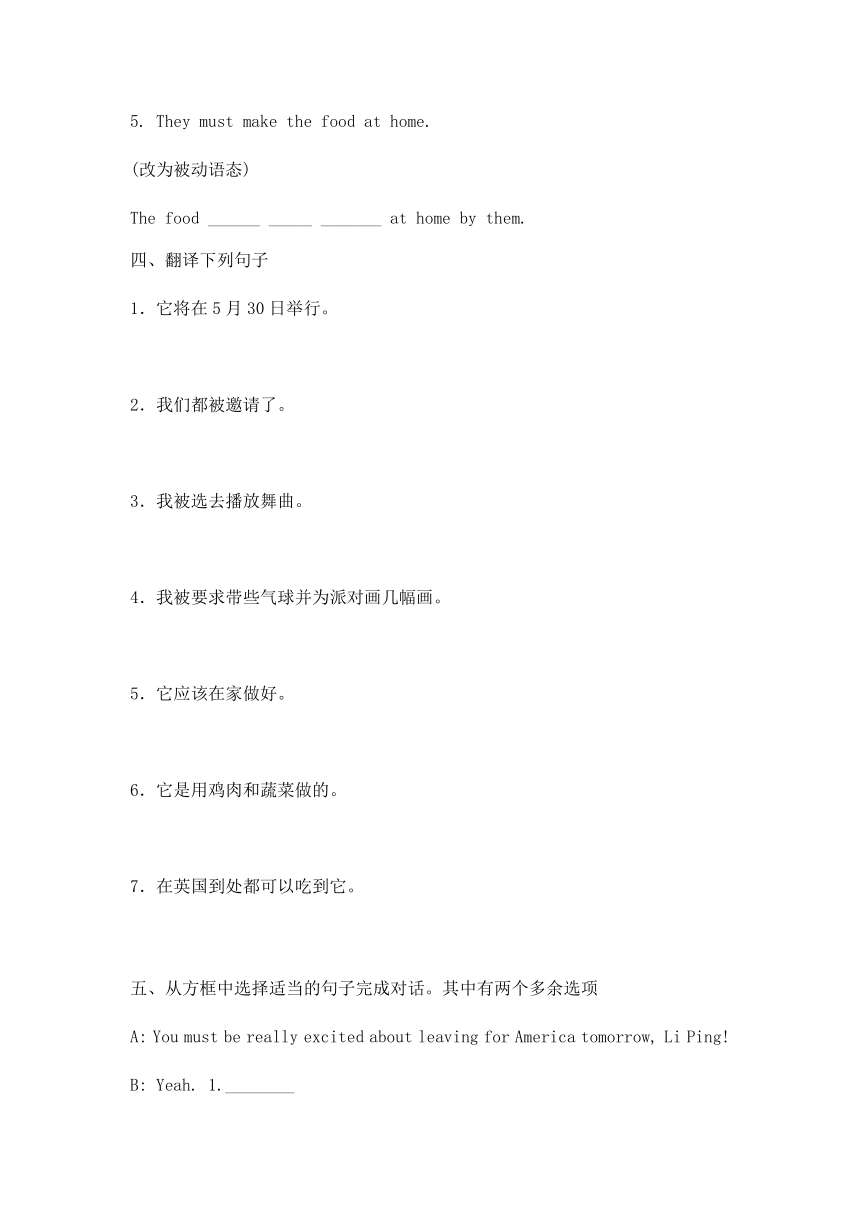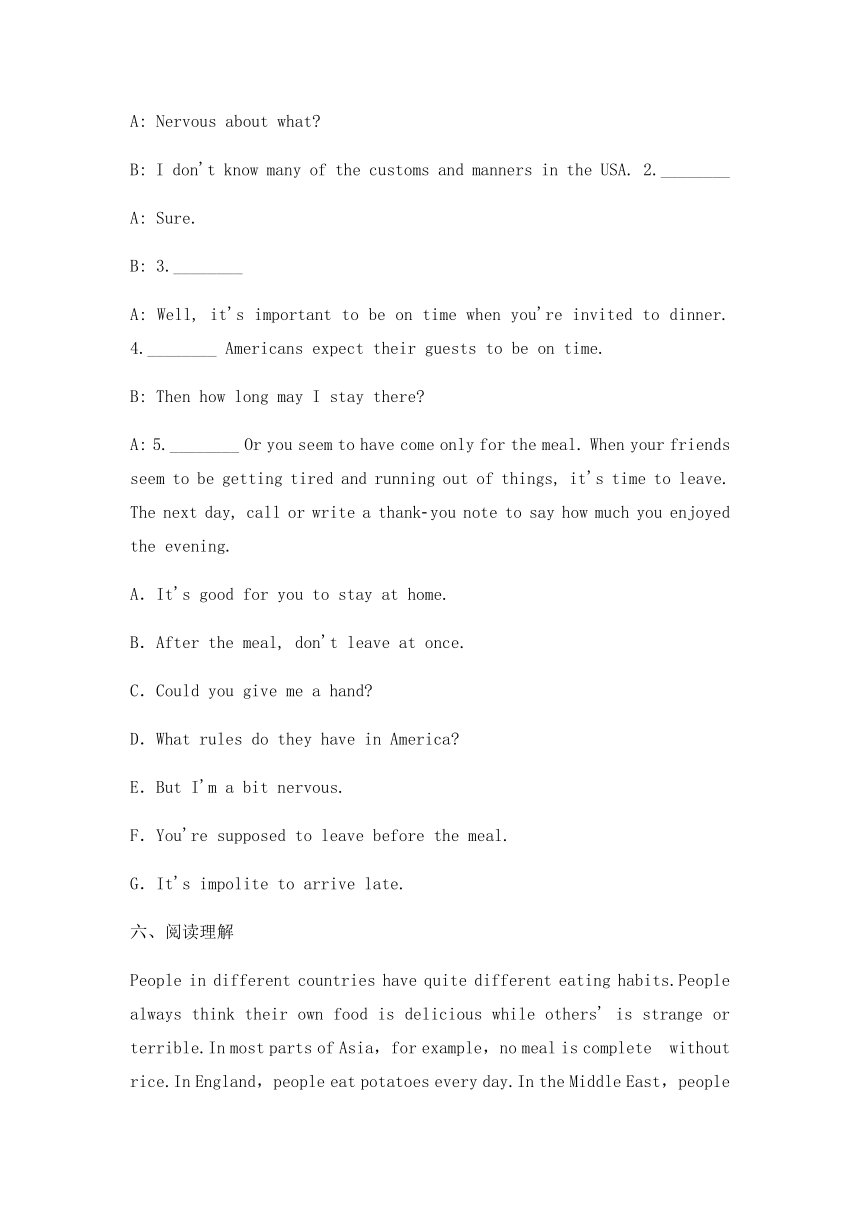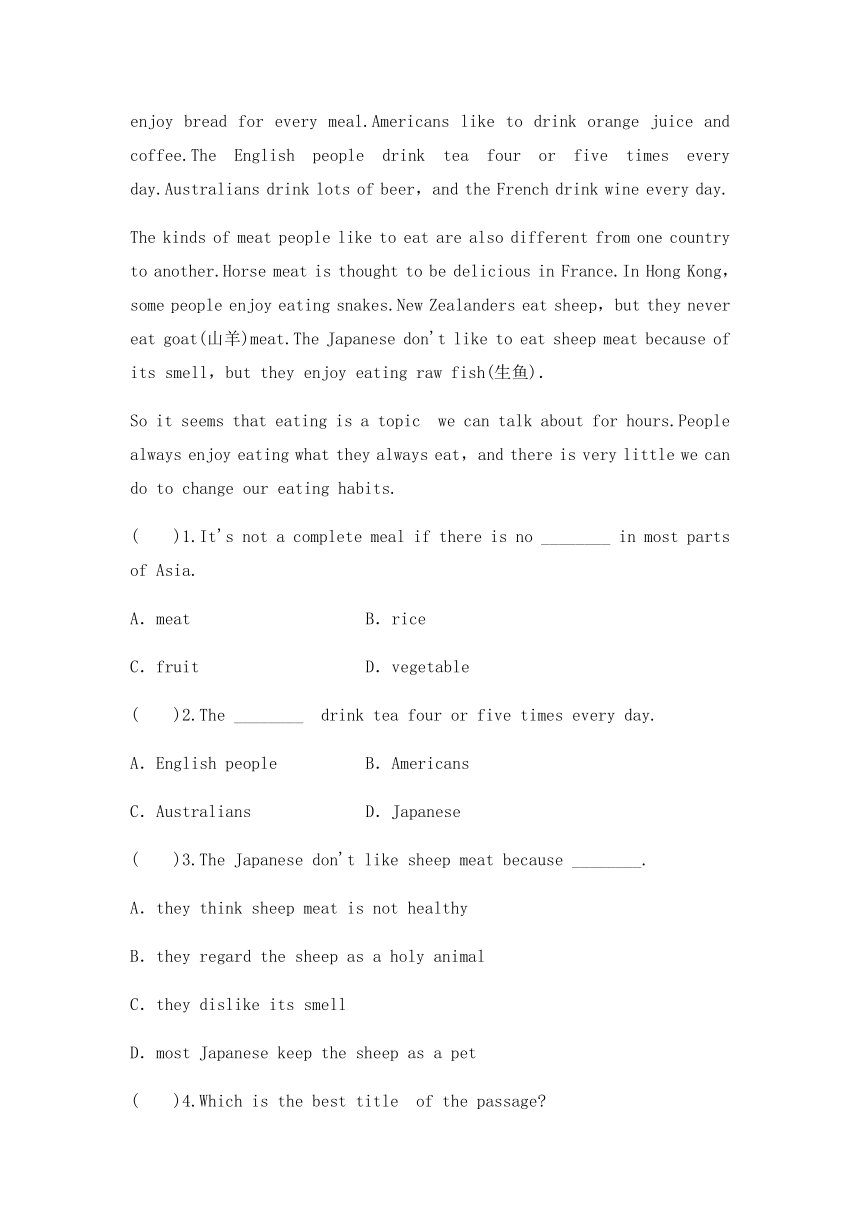Module 6 Eating together Unit 1 达标检测(含解析)2024-2025学年外研版九年级英语下册
文档属性
| 名称 | Module 6 Eating together Unit 1 达标检测(含解析)2024-2025学年外研版九年级英语下册 |  | |
| 格式 | docx | ||
| 文件大小 | 26.4KB | ||
| 资源类型 | 教案 | ||
| 版本资源 | 外研版 | ||
| 科目 | 英语 | ||
| 更新时间 | 2025-03-11 14:13:22 | ||
图片预览





文档简介
Module6 Unit1 达标检测
一、用括号中所给单词的适当形式填空
1.“I can't miss this chance!” She waved the ________ (invite).
2.Andrew often does DIY with different ________ (knife) in his free time.
3.Our English teacher asked us ________ (finish) the English composition before class.
4.My new friend Jane will come to my home and my mother wants to cook some ________ (tradition) food for her.
二、选择题:
1. --Who's the little boy in the photo, Susan
--It's me. This photo _____ ten years ago.
A. takes B. is taken C. took D. was taken
2.—How much sugar should I put into your coffee
—Two ________.
A.spoons B.kilos C.cups D.bowls
3. Old people must _____.
A. be spoken to politely B. speak to polite
C. be spoken politely D. speak polite
4.You should require Bob________ his own clothes. He is ten years old now.
A.wash B.washes C.washing D.to wash
5.—Children ________ to follow the rules from a young age.
—I agree.
A.educated B.educate C.should educate D.should be educated
6. ---Where ____ the 2010 World Expo _____
--In Shanghai.
A. does; hold B. is; held C. will; be held D. will; hold
7.—Good news!Self driving cars will come into use in one or two years.
—Really?We're expecting to see how they ________.
A.are making B.are made C.make D.will make
8. Millions of trees _____ around our city every year. Our environment is getting better.
A. are planting B. were planted C. planted D. are planted
三、句型转换
1. Tom's mother told him not to talk with the strangers. (改为同义句)
Tom ______ ______ not to talk with the strangers by his mother.
2. This medicine doesn't work on her. (改为同义句).
This medicine is ______ _______ ______ her.
3. The earthquake destroyed many houses.
(改为被动语态)
Many houses _______ __________ ______ the earthquake.
4. I'm going to play football this afternoon. And you (改为同义句)
I'm going to play football this afternoon. ________ ________ you
5. They must make the food at home.
(改为被动语态)
The food ______ _____ _______ at home by them.
翻译下列句子
1.它将在5月30日举行。
2.我们都被邀请了。
3.我被选去播放舞曲。
4.我被要求带些气球并为派对画几幅画。
5.它应该在家做好。
6.它是用鸡肉和蔬菜做的。
7.在英国到处都可以吃到它。
五、从方框中选择适当的句子完成对话。其中有两个多余选项
A: You must be really excited about leaving for America tomorrow, Li Ping!
B: Yeah. 1.________
A: Nervous about what
B: I don't know many of the customs and manners in the USA. 2.________
A: Sure.
B: 3.________
A: Well, it's important to be on time when you're invited to dinner. 4.________ Americans expect their guests to be on time.
B: Then how long may I stay there
A: 5.________ Or you seem to have come only for the meal. When your friends seem to be getting tired and running out of things, it's time to leave. The next day, call or write a thank you note to say how much you enjoyed the evening.
A.It's good for you to stay at home.
B.After the meal, don't leave at once.
C.Could you give me a hand
D.What rules do they have in America
E.But I'm a bit nervous.
F.You're supposed to leave before the meal.
G.It's impolite to arrive late.
六、阅读理解
People in different countries have quite different eating habits.People always think their own food is delicious while others' is strange or terrible.In most parts of Asia,for example,no meal is complete without rice.In England,people eat potatoes every day.In the Middle East,people enjoy bread for every meal.Americans like to drink orange juice and coffee.The English people drink tea four or five times every day.Australians drink lots of beer,and the French drink wine every day.
The kinds of meat people like to eat are also different from one country to another.Horse meat is thought to be delicious in France.In Hong Kong,some people enjoy eating snakes.New Zealanders eat sheep,but they never eat goat(山羊)meat.The Japanese don't like to eat sheep meat because of its smell,but they enjoy eating raw fish(生鱼).
So it seems that eating is a topic we can talk about for hours.People always enjoy eating what they always eat,and there is very little we can do to change our eating habits.
( )1.It's not a complete meal if there is no ________ in most parts of Asia.
A.meat B.rice
C.fruit D.vegetable
( )2.The ________ drink tea four or five times every day.
A.English people B.Americans
C.Australians D.Japanese
( )3.The Japanese don't like sheep meat because ________.
A.they think sheep meat is not healthy
B.they regard the sheep as a holy animal
C.they dislike its smell
D.most Japanese keep the sheep as a pet
( )4.Which is the best title of the passage
A.Healthy Food
B.Different Eating Habits
C.Different Table Manners
D.How to Cook Food
一、单词适当形式填空
invitation:“the” 后接名词,“invite” 的名词形式是 “invitation”,意为 “邀请函”,这里说她挥舞着邀请函,故填 “invitation”。
knives:“different” 后接可数名词复数,“knife” 的复数形式是 “knives”,表示 “刀”,这里说安德鲁在空闲时间用不同的刀做手工,故填 “knives”。
to finish:“ask sb. to do sth.” 表示 “要求某人做某事”,所以填 “to finish”,意思是我们英语老师要求我们在课前完成英语作文。
traditional:“food” 是名词,用形容词修饰,“tradition” 的形容词形式是 “traditional”,表示 “传统的”,这里说妈妈想为简做一些传统食物,故填 “traditional”。
二、选择题
D:“photo” 和 “take” 之间是被动关系,用被动语态 “be + 过去分词”。根据 “ten years ago” 可知时态是一般过去时,主语 “this photo” 是第三人称单数,be 动词用 “was”,“take” 的过去分词是 “taken”,所以选 D,意思是这张照片是十年前拍的。
A:根据 “How much sugar” 可知问的是放多少糖,“spoon” 表示 “勺子”,“two spoons” 表示 “两勺”,符合语境,“kilo” 千克;“cup” 杯子;“bowl” 碗,所以选 A。
A:“Old people” 和 “speak to” 之间是被动关系,用被动语态 “be + 过去分词”,“speak to sb. politely” 表示 “礼貌地和某人说话”,被动形式为 “sb. be spoken to politely”,所以选 A,意思是必须礼貌地和老人说话。
D:“require sb. to do sth.” 表示 “要求某人做某事”,所以用 “to wash”,选 D,这里说你应该要求鲍勃洗他自己的衣服。
D:“Children” 和 “educate” 之间是被动关系,用被动语态 “be + 过去分词”,根据语境这里表示应该被教育,所以用 “should be educated”,选 D,意思是孩子们从小就应该被教育遵守规则。
C:“the 2010 World Expo” 和 “hold” 之间是被动关系,用被动语态 “be + 过去分词”,根据语境可知问的是 2010 年世博会将在哪里举办,用一般将来时的被动语态 “will + be + 过去分词”,“hold” 的过去分词是 “held”,所以选 C。
B:“they” 指代 “Self - driving cars”,和 “make” 之间是被动关系,用被动语态 “be + 过去分词”,这里说我们期待看到它们是如何被制造的,用一般现在时的被动语态,所以选 B。
D:“trees” 和 “plant” 之间是被动关系,用被动语态 “be + 过去分词”。根据 “every year” 可知用一般现在时,主语 “Millions of trees” 是复数,be 动词用 “are”,“plant” 的过去分词是 “planted”,所以选 D,意思是每年我们城市周围种植数百万棵树。
三、句型转换
was told:原句是主动语态,改为被动语态时,主语 “Tom” 和 “tell” 是被动关系,用被动语态 “be + 过去分词”。根据原句 “told” 可知是一般过去时,主语 “Tom” 是第三人称单数,be 动词用 “was”,“tell” 的过去分词是 “told”,所以填 “was told”。
useless to:“doesn't work on her” 表示 “对她不起作用”,“useless” 表示 “无用的”,“be useless to sb.” 表示 “对某人无用”,所以填 “useless to”。
were destroyed by:原句是一般过去时,变为被动语态时,主语 “Many houses” 是复数,be 动词用 “were”,“destroy” 的过去分词是 “destroyed”,“by + 动作执行者” 表示 “被……”,所以填 “were destroyed by”。
What about:“What about... ” 和 “And you ” 都可表示 “…… 怎么样?”,用于询问对方相同的情况,所以填 “What about”。
must be made:原句是含有情态动词 “must” 的主动语态,变为被动语态时结构为 “情态动词 + be + 过去分词”,“make” 的过去分词是 “made”,所以填 “must be made”。
四、翻译句子
It'll be held on the 30th of May.:“be held” 是一般将来时的被动语态,表示 “将被举行”,“on the 30th of May” 表示 “在 5 月 30 日”。
We're all invited.:“be invited” 表示 “被邀请”,“all” 表示 “都”,用于 “be” 动词之后。
I was chosen to play the dance music.:“was chosen” 是一般过去时的被动语态,表示 “被选中”,“to play the dance music” 表示目的,“play the dance music” 表示 “播放舞曲”。
I was asked to bring some balloons and paint some pictures for the party.:“was asked” 是一般过去时的被动语态,表示 “被要求”,“ask sb. to do sth.” 的被动形式为 “sb. be asked to do sth.”,“bring some balloons” 表示 “带些气球”,“paint some pictures” 表示 “画几幅画”,“for the party” 表示 “为派对”。
It should be cooked at home.:“should be cooked” 是含有情态动词 “should” 的被动语态,表示 “应该被做”,“at home” 表示 “在家”。
It's made with chicken and vegetables.:“be made with...” 表示 “用…… 制成”,这里表示用鸡肉和蔬菜制成,“It's” 是 “It is” 的缩写。
It's eaten everywhere in England.:“be eaten” 是一般现在时的被动语态,表示 “被吃”,“everywhere in England” 表示 “在英国到处”。
五、补全对话
E:根据下一句 “Nervous about what ” 可知这里说有点紧张,所以选 E “但我有点紧张”。
C:根据上一句 “我不知道美国的许多风俗习惯” 以及下一句 “Sure” 可知这里是请求帮助,所以选 C“你能帮我一下吗?”。
D:根据下一句 “Well, it's important to be on time when you're invited to dinner.” 可知这里问美国有什么规则,所以选 D“他们在美国有什么规则?”。
G:根据 “it's important to be on time when you're invited to dinner.” 以及 “Americans expect their guests to be on time.” 可知迟到是不礼貌的,所以选 G “迟到是不礼貌的”。
B:根据 “Or you seem to have come only for the meal. When your friends seem to be getting tired and running out of things, it's time to leave.” 可知饭后不要马上离开,所以选 B“饭后,不要马上离开”。
六、阅读理解
B:根据 “In most parts of Asia,for example,no meal is complete without rice.” 可知在亚洲大部分地区,如果没有米饭,一顿饭就不完整,所以选 B。
A:根据 “The English people drink tea four or five times every day.” 可知英国人每天喝四五次茶,所以选 A。
C:根据 “The Japanese don't like to eat sheep meat because of its smell” 可知日本人不喜欢吃羊肉是因为它的气味,所以选 C。
B:文章主要介绍了不同国家人们不同的饮食习惯,所以标题选 B “不同的饮食习惯” 最合适。“Healthy Food” 健康食物;“Different Table Manners” 不同的餐桌礼仪;“How to Cook Food” 如何烹饪食物,均不符合文章主旨。
一、用括号中所给单词的适当形式填空
1.“I can't miss this chance!” She waved the ________ (invite).
2.Andrew often does DIY with different ________ (knife) in his free time.
3.Our English teacher asked us ________ (finish) the English composition before class.
4.My new friend Jane will come to my home and my mother wants to cook some ________ (tradition) food for her.
二、选择题:
1. --Who's the little boy in the photo, Susan
--It's me. This photo _____ ten years ago.
A. takes B. is taken C. took D. was taken
2.—How much sugar should I put into your coffee
—Two ________.
A.spoons B.kilos C.cups D.bowls
3. Old people must _____.
A. be spoken to politely B. speak to polite
C. be spoken politely D. speak polite
4.You should require Bob________ his own clothes. He is ten years old now.
A.wash B.washes C.washing D.to wash
5.—Children ________ to follow the rules from a young age.
—I agree.
A.educated B.educate C.should educate D.should be educated
6. ---Where ____ the 2010 World Expo _____
--In Shanghai.
A. does; hold B. is; held C. will; be held D. will; hold
7.—Good news!Self driving cars will come into use in one or two years.
—Really?We're expecting to see how they ________.
A.are making B.are made C.make D.will make
8. Millions of trees _____ around our city every year. Our environment is getting better.
A. are planting B. were planted C. planted D. are planted
三、句型转换
1. Tom's mother told him not to talk with the strangers. (改为同义句)
Tom ______ ______ not to talk with the strangers by his mother.
2. This medicine doesn't work on her. (改为同义句).
This medicine is ______ _______ ______ her.
3. The earthquake destroyed many houses.
(改为被动语态)
Many houses _______ __________ ______ the earthquake.
4. I'm going to play football this afternoon. And you (改为同义句)
I'm going to play football this afternoon. ________ ________ you
5. They must make the food at home.
(改为被动语态)
The food ______ _____ _______ at home by them.
翻译下列句子
1.它将在5月30日举行。
2.我们都被邀请了。
3.我被选去播放舞曲。
4.我被要求带些气球并为派对画几幅画。
5.它应该在家做好。
6.它是用鸡肉和蔬菜做的。
7.在英国到处都可以吃到它。
五、从方框中选择适当的句子完成对话。其中有两个多余选项
A: You must be really excited about leaving for America tomorrow, Li Ping!
B: Yeah. 1.________
A: Nervous about what
B: I don't know many of the customs and manners in the USA. 2.________
A: Sure.
B: 3.________
A: Well, it's important to be on time when you're invited to dinner. 4.________ Americans expect their guests to be on time.
B: Then how long may I stay there
A: 5.________ Or you seem to have come only for the meal. When your friends seem to be getting tired and running out of things, it's time to leave. The next day, call or write a thank you note to say how much you enjoyed the evening.
A.It's good for you to stay at home.
B.After the meal, don't leave at once.
C.Could you give me a hand
D.What rules do they have in America
E.But I'm a bit nervous.
F.You're supposed to leave before the meal.
G.It's impolite to arrive late.
六、阅读理解
People in different countries have quite different eating habits.People always think their own food is delicious while others' is strange or terrible.In most parts of Asia,for example,no meal is complete without rice.In England,people eat potatoes every day.In the Middle East,people enjoy bread for every meal.Americans like to drink orange juice and coffee.The English people drink tea four or five times every day.Australians drink lots of beer,and the French drink wine every day.
The kinds of meat people like to eat are also different from one country to another.Horse meat is thought to be delicious in France.In Hong Kong,some people enjoy eating snakes.New Zealanders eat sheep,but they never eat goat(山羊)meat.The Japanese don't like to eat sheep meat because of its smell,but they enjoy eating raw fish(生鱼).
So it seems that eating is a topic we can talk about for hours.People always enjoy eating what they always eat,and there is very little we can do to change our eating habits.
( )1.It's not a complete meal if there is no ________ in most parts of Asia.
A.meat B.rice
C.fruit D.vegetable
( )2.The ________ drink tea four or five times every day.
A.English people B.Americans
C.Australians D.Japanese
( )3.The Japanese don't like sheep meat because ________.
A.they think sheep meat is not healthy
B.they regard the sheep as a holy animal
C.they dislike its smell
D.most Japanese keep the sheep as a pet
( )4.Which is the best title of the passage
A.Healthy Food
B.Different Eating Habits
C.Different Table Manners
D.How to Cook Food
一、单词适当形式填空
invitation:“the” 后接名词,“invite” 的名词形式是 “invitation”,意为 “邀请函”,这里说她挥舞着邀请函,故填 “invitation”。
knives:“different” 后接可数名词复数,“knife” 的复数形式是 “knives”,表示 “刀”,这里说安德鲁在空闲时间用不同的刀做手工,故填 “knives”。
to finish:“ask sb. to do sth.” 表示 “要求某人做某事”,所以填 “to finish”,意思是我们英语老师要求我们在课前完成英语作文。
traditional:“food” 是名词,用形容词修饰,“tradition” 的形容词形式是 “traditional”,表示 “传统的”,这里说妈妈想为简做一些传统食物,故填 “traditional”。
二、选择题
D:“photo” 和 “take” 之间是被动关系,用被动语态 “be + 过去分词”。根据 “ten years ago” 可知时态是一般过去时,主语 “this photo” 是第三人称单数,be 动词用 “was”,“take” 的过去分词是 “taken”,所以选 D,意思是这张照片是十年前拍的。
A:根据 “How much sugar” 可知问的是放多少糖,“spoon” 表示 “勺子”,“two spoons” 表示 “两勺”,符合语境,“kilo” 千克;“cup” 杯子;“bowl” 碗,所以选 A。
A:“Old people” 和 “speak to” 之间是被动关系,用被动语态 “be + 过去分词”,“speak to sb. politely” 表示 “礼貌地和某人说话”,被动形式为 “sb. be spoken to politely”,所以选 A,意思是必须礼貌地和老人说话。
D:“require sb. to do sth.” 表示 “要求某人做某事”,所以用 “to wash”,选 D,这里说你应该要求鲍勃洗他自己的衣服。
D:“Children” 和 “educate” 之间是被动关系,用被动语态 “be + 过去分词”,根据语境这里表示应该被教育,所以用 “should be educated”,选 D,意思是孩子们从小就应该被教育遵守规则。
C:“the 2010 World Expo” 和 “hold” 之间是被动关系,用被动语态 “be + 过去分词”,根据语境可知问的是 2010 年世博会将在哪里举办,用一般将来时的被动语态 “will + be + 过去分词”,“hold” 的过去分词是 “held”,所以选 C。
B:“they” 指代 “Self - driving cars”,和 “make” 之间是被动关系,用被动语态 “be + 过去分词”,这里说我们期待看到它们是如何被制造的,用一般现在时的被动语态,所以选 B。
D:“trees” 和 “plant” 之间是被动关系,用被动语态 “be + 过去分词”。根据 “every year” 可知用一般现在时,主语 “Millions of trees” 是复数,be 动词用 “are”,“plant” 的过去分词是 “planted”,所以选 D,意思是每年我们城市周围种植数百万棵树。
三、句型转换
was told:原句是主动语态,改为被动语态时,主语 “Tom” 和 “tell” 是被动关系,用被动语态 “be + 过去分词”。根据原句 “told” 可知是一般过去时,主语 “Tom” 是第三人称单数,be 动词用 “was”,“tell” 的过去分词是 “told”,所以填 “was told”。
useless to:“doesn't work on her” 表示 “对她不起作用”,“useless” 表示 “无用的”,“be useless to sb.” 表示 “对某人无用”,所以填 “useless to”。
were destroyed by:原句是一般过去时,变为被动语态时,主语 “Many houses” 是复数,be 动词用 “were”,“destroy” 的过去分词是 “destroyed”,“by + 动作执行者” 表示 “被……”,所以填 “were destroyed by”。
What about:“What about... ” 和 “And you ” 都可表示 “…… 怎么样?”,用于询问对方相同的情况,所以填 “What about”。
must be made:原句是含有情态动词 “must” 的主动语态,变为被动语态时结构为 “情态动词 + be + 过去分词”,“make” 的过去分词是 “made”,所以填 “must be made”。
四、翻译句子
It'll be held on the 30th of May.:“be held” 是一般将来时的被动语态,表示 “将被举行”,“on the 30th of May” 表示 “在 5 月 30 日”。
We're all invited.:“be invited” 表示 “被邀请”,“all” 表示 “都”,用于 “be” 动词之后。
I was chosen to play the dance music.:“was chosen” 是一般过去时的被动语态,表示 “被选中”,“to play the dance music” 表示目的,“play the dance music” 表示 “播放舞曲”。
I was asked to bring some balloons and paint some pictures for the party.:“was asked” 是一般过去时的被动语态,表示 “被要求”,“ask sb. to do sth.” 的被动形式为 “sb. be asked to do sth.”,“bring some balloons” 表示 “带些气球”,“paint some pictures” 表示 “画几幅画”,“for the party” 表示 “为派对”。
It should be cooked at home.:“should be cooked” 是含有情态动词 “should” 的被动语态,表示 “应该被做”,“at home” 表示 “在家”。
It's made with chicken and vegetables.:“be made with...” 表示 “用…… 制成”,这里表示用鸡肉和蔬菜制成,“It's” 是 “It is” 的缩写。
It's eaten everywhere in England.:“be eaten” 是一般现在时的被动语态,表示 “被吃”,“everywhere in England” 表示 “在英国到处”。
五、补全对话
E:根据下一句 “Nervous about what ” 可知这里说有点紧张,所以选 E “但我有点紧张”。
C:根据上一句 “我不知道美国的许多风俗习惯” 以及下一句 “Sure” 可知这里是请求帮助,所以选 C“你能帮我一下吗?”。
D:根据下一句 “Well, it's important to be on time when you're invited to dinner.” 可知这里问美国有什么规则,所以选 D“他们在美国有什么规则?”。
G:根据 “it's important to be on time when you're invited to dinner.” 以及 “Americans expect their guests to be on time.” 可知迟到是不礼貌的,所以选 G “迟到是不礼貌的”。
B:根据 “Or you seem to have come only for the meal. When your friends seem to be getting tired and running out of things, it's time to leave.” 可知饭后不要马上离开,所以选 B“饭后,不要马上离开”。
六、阅读理解
B:根据 “In most parts of Asia,for example,no meal is complete without rice.” 可知在亚洲大部分地区,如果没有米饭,一顿饭就不完整,所以选 B。
A:根据 “The English people drink tea four or five times every day.” 可知英国人每天喝四五次茶,所以选 A。
C:根据 “The Japanese don't like to eat sheep meat because of its smell” 可知日本人不喜欢吃羊肉是因为它的气味,所以选 C。
B:文章主要介绍了不同国家人们不同的饮食习惯,所以标题选 B “不同的饮食习惯” 最合适。“Healthy Food” 健康食物;“Different Table Manners” 不同的餐桌礼仪;“How to Cook Food” 如何烹饪食物,均不符合文章主旨。
同课章节目录
- Module 1 Travel
- Unit 1 We toured the city by bus and by taxi
- Unit 2 It's a long story.
- Unit 3 Language in use
- Module 2 Education
- Unit 1 They don't sit in rows.
- Unit 2 What do I like best about school?
- Unit 3 Language in use
- Module 3 Life now and then
- Unit 1 They sometimes work harder.
- Unit 2 I think life is better today.
- Unit 3 Language in use.
- Module 4 Rules and suggestions
- Unit 1 You must be careful of falling stones.
- Unit 2 we must keep the camp clean.
- Unit 3 Language in use.
- Revison A
- Module 5 Look after yourself
- Unit 1 We'd better get you to hospital.
- Unit 2 Get off the sofa!
- Unit 3 Language in use.
- Module 6 Eating togethe
- Unit 1 When is the school-leavers' party?
- Unit 2 Knives and forks are used for most Western
- Unit 3 Language in use
- Module 7 English for you and me
- Unit 1 Have you ever been to an English corner?
- Unit 2 We all own English.
- Unit 3 Language in use
- Module 8 My future life
- Unit 1 Here's to our friendship and the future
- Unit 2 I know that you will be better at maths.
- Unit 3 Language in use
- Revison B
